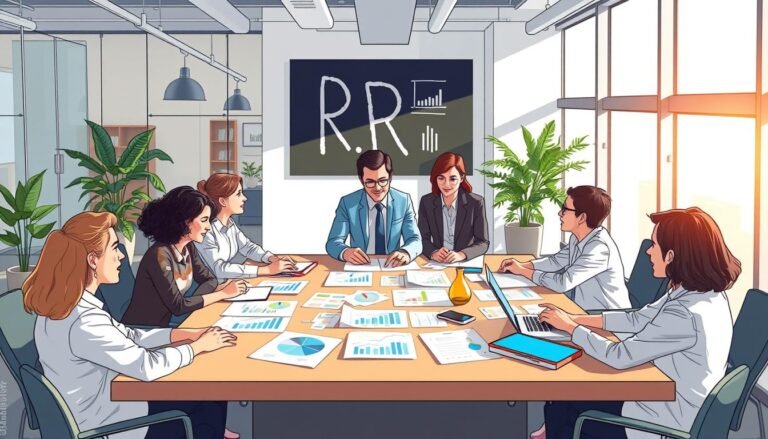How can HR departments in Ireland support leadership development?
In Ireland, HR departments play a key role in boosting leadership skills. This is very important now because 90% of organizations here need more skilled workers. Leadership and influencing skills are often lacking in these companies.
Irish HR departments are using a special plan to make leaders better at all job levels. This plan doesn’t just make work better and more fun. It’s also a big help during tough times, like the COVID-19 pandemic. By helping leaders grow, HR makes healthcare places safer and kinder.
Big issues, such as losing workers, stress-related issues, and managing working from home, show why HR’s leadership is so crucial. By looking after talents, saving resources, and keeping good work relationships, HR in Ireland can help leaders deal with today’s and tomorrow’s problems. So, what HR does for leadership matters a lot for how well organizations do.
The Importance of Leadership Development in Irish Organizations
Leadership development is key in Ireland, especially in the healthcare sector. It helps create an engaged workforce and a great workplace culture. Good leaders in healthcare make a big difference in patient care and how happy staff are.
Recently, a survey showed that nine in ten Irish organizations lack leadership skills. There’s a big need for leadership training. 90% of HR pros believe leadership development keeps employees around. This shows how important it is to have good leaders to keep a team engaged.
In healthcare, strong leadership is very important, especially in tough times like the COVID-19 pandemic. The HSE is an example of how good leaders help in a crisis. But, Irish groups aren’t investing enough in training their leaders.
Only half the managers in Ireland are ready to lead in a mixed work setting, which is getting more common. This shows why we need better leadership training. As hybrid working grows, leading well is crucial for a happy team and steady growth for the organization.
The data clearly shows that improving leadership development is vital for Irish groups, especially in healthcare. Strong leaders, a happy team, and success are closely linked. So, improving leadership skills should be a big goal for HR and organizational plans.
Understanding the Capability and Culture Leadership Development Framework
This leadership framework gives HSE personnel chances to grow at every career step. It’s crucial to see the wide benefits this can offer for career progress.
Leading Self
Leading oneself starts the journey. It’s about building the skills needed for top-notch healthcare. This includes becoming self-aware, learning to bounce back, and aiming for personal growth. This step lays a strong base for future leadership roles.
Leading People and Teams
The next phase is leading teams. It’s where skills are used to lead effective groups. Teams work better when they share ideas and feel safe doing so. Encouraging teamwork and fun activities helps strengthen them.
Leading Functions and Services
Here, HSE pros step up to manage bigger tasks in healthcare. This stage looks at aligning plans with the organization’s, using resources well, and upholding quality services. It’s key for keeping healthcare teams ready and working together smoothly.
Senior Leadership Level
At the senior level, leaders guide the whole organization. They set goals, create visions, and lead through tough times. Skills like strategic thinking and staying resilient are crucial here. They help keep the organization ahead in healthcare’s fast changes.
How can HR departments in Ireland support leadership development?
HR departments in Ireland have a key role in helping leaders grow. They use various tools and methods to do this. For example, the Capability and Culture Leadership Development Framework helps the Health Service Executive (HSE) improve their leaders.
This approach boosts both career paths and keeps employees happy. It does this by making sure leaders have the skills they need.
One big issue in Ireland is not having enough skilled workers. This is a challenge for nine out of ten places. Especially in everyday jobs. To tackle this, HR helps leaders get better at leading. This means they help fill the gap in skills that people need.
By adding leadership skills to hiring, HR finds people who could grow into leaders. And they make sure these possible leaders get the training they need.
More and more companies in Ireland are moving to flexible work. 40% are planning to use a mix of office and remote work more. A third of them are also starting to let people work flexible hours. But, not all managers have learned how to handle this new way of working.
This is where HR can help. They can set up training programs for managers. These programs will teach them how best to work in these new situations.
HR also takes care of workers’ mental health. Over half the companies say too much work is harmful to mental health. And many employees miss work because of it. So, HR sets up workshops, one-on-one meetings, and helps share knowledge. This can make a big difference in how workers feel.
Finally, HR does a lot more to grow HSE’s leaders. They run training programs and help new managers get started right. By doing this, HR makes sure there’s a strong group of leaders to lead the way in healthcare. They’re preparing for the future needs of the job.
Designing Effective Leadership Training Programs
Creating great leadership training is key to growing strong leaders and making organizations successful. By focusing on certain important parts, training programs can really improve how well people work and their commitment.
Identifying Leadership Competencies
The first step in making a leadership training design is to find the key skills needed for good leaders. There’s research showing 45% of bosses think they don’t have the courage to help their staff grow in key areas. This tells us it’s vital to pinpoint where we can fill in these skill gaps. There are over 70,000 books to help us do this, and it’s often a team effort.
Customizing Training Modules
After picking out the essential skills, the next step is to create training specifically for each leadership role and stage of a career. Companies put more than $14 billion every year into these tailored training solutions. This focused training helps every leader in a way that’s just right for them. It helps them keep growing.
Measuring Training Effectiveness
Finally, it’s important to check if the training actually works. We need to make sure it’s making things better. Since bosses affect almost 70% of how much people care about their work, it’s critical that we see how training changes this. Good leadership training should make work better, help teams work well together, and keep people on the team happy.
Globally, 85% of people are unhappy at work with over 60% in the US not being ‘engaged’. Good leadership training can help change this by making a more committed and happy workforce.
Competency-based development and
great leadership programs are key to stop people from leaving and keep them happy, which makes the whole company work better.
The Role of Mentorship Initiatives in Leadership Development
Mentorship is key to building leaders in Irish companies. It sets up a helpful relationship between a mentor and a mentee. This helps new leaders learn from experts and grow their skills.
According to David Clutterbuck, it’s important to know what you want from mentoring.
Starting a mentorship needs careful planning. The mentor and mentee should know what they expect from each other. It’s also important to keep updating the pool of mentors with new training.
Having a variety of mentors can benefit everyone. The more diverse the group of mentors, the more perspectives and experiences the mentee can learn from. Mentees are encouraged to choose mentors who have advanced in their careers or possess qualities they admire.
A good mentorship agreement is crucial. It outlines what everyone should expect and do. This makes for a strong, productive mentorship.
Mentorship programs are also vital for passing leadership roles to new people smoothly. By preparing future leaders, companies can ensure their long-term success.
In conclusion, mentorship is key for individual and organizational growth. It equips leaders with the skills they need and prepares the company for the future.
Executive Coaching for Developing Future Leaders

Executive coaching is a personalized way to grow our next leaders. Adeo Consulting in Ireland has over 15 years of experience. They have found a way to develop leaders who are smart with their emotions. This is really important now. Their method meets both the company’s and the leader’s needs. It makes sure future leaders really grow.
Benefits of Executive Coaching
The benefits of executive coaching are clear. An amazing 94% of leaders feel more confident after coaching, according to the Association for Talent Development. Adeo Consulting focuses on skills like understanding and being smart with emotions. They say these make up a big part, 80-90%, of what great leaders are. With better decision-making and people skills, these leaders can guide teams well and handle tough problems.
Implementing Executive Coaching Programs
Setting up leadership coaching programs needs a solid plan. It should match the company’s goals. Adeo Consulting helps big and small companies and the government make programs for top and mid-level leaders. These programs last 3 months. They have regular sessions to keep improving. Their Leadership Bench Program helps spot and grow future leaders within a company. This gets them ready for more important roles.
According to LinkedIn Learning, 89% of those in charge of Learning and Development think training workers is key for success. Companies that focus on coaching not only get better results. They also improve how employees work together and communicate. This info comes from the International Coaching Federation.
Talent Management Strategies for Succession Planning
Succession planning now relies on strong talent management to keep a steady flow of capable leaders. Old methods are falling short in today’s fast-changing world. To meet these new challenges, companies need to change how they develop their future leaders.
Companies are now developing groups of talented people who can cover many important roles. This approach makes the workforce stronger and more flexible. It helps deal with worries about the current leadership not being able to meet future challenges.
Also, companies are focusing on growing talent for a range of positions instead of just a few key jobs. This helps keep things running smoothly despite any financial setbacks or market changes. It’s all about making sure the company’s main goals are met no matter what.
There are big hurdles to overcome, like losing valuable knowledge when reorganizing. There’s also the challenge of keeping the team motivated without a big budget. But, by keeping good people and having strong plans for the future, companies can avoid problems like not having the right skills when needed.
Now, it’s a must to include details on how succession planning is done in yearly reports. This includes how leaders are chosen and efforts to have a diverse group of future leaders. Connecting these efforts with the company’s main goals shows how important it is to be prepared for any leadership change.
Emotional Intelligence Development in Leaders
Emotional intelligence is key for successful leadership, enhancing not only an individual’s work but also team effort and the organization’s goals. Research has proven that it matters more for doing well at work than IQ, skills, or how much you’ve worked.
Given today’s tough business world, it’s vital for leaders to build their emotional intelligence skills. Teams with strong EI boost their goal achievement by 25%. This success is mainly due to better understanding and handling of emotions, as Salovey and Mayer discovered.
Importance of Emotional Intelligence
Understanding the role of emotional intelligence in leading is essential. The Harvard Business Review considers team EI as a top idea for making organizations better. This is because high EI helps build stronger team bonds, leading to joint success and a supportive workplace.
Stats show that 71% of employers value emotional intelligence more than IQ when hiring. Also, 59% wouldn’t hire someone with high IQ but low emotional skills. This shows how vital working on EI is for leaders.
Emotional Intelligence Training Methods
Leaders need specific emotional intelligence training to succeed. This could involve workshops, coaching, and tests centered on understanding yourself, showing empathy, and relating to others. Done right, these programs can boost leadership and team performance by a quarter.
For example, teaching EI in factories increased productivity for over 90% of employees, while sales teams became 12% more effective each year. Such training benefits not just at work but also in personal success.
By helping leaders improve their emotional intelligence, we create better team leaders. This leads to more productivity and a pleasant work atmosphere. Using EI training, HR teams can make sure leaders are fully equipped to face any challenge now and in the future.
Utilizing Performance Feedback Mechanisms
Leadership development is key in keeping employees and attracting new ones, especially in Ireland. 90% say there’s been a lack of skills in the last year. Good feedback helps leaders understand what they do well, and where they can improve. This leads to better strategies and decisions. It helps create a culture of always getting better and being great at assessing leaders.
It’s important to regularly check performance and give feedback. But, feedback should be mostly positive. Around 80% should be good vibes, while 20% should point out areas to grow. This mix keeps people motivated. It’s also vital to be gentle and respectful in how feedback is given. In Ireland, HR teams are leading in supporting diverse work and making the employee experience better. They really know how to do feedback right.
Technology is changing the game too. 60% of HR work is now done with machines, with things like hiring being 54% automated. Automating stuff makes giving feedback quicker and more based on facts. Using hard data, HR can give super helpful feedback. This kind of feedback helps businesses stay sharp in their people practices. It’s all about getting better as a team, making work great for everyone, and keeping a strong group of workers ready for the future.








